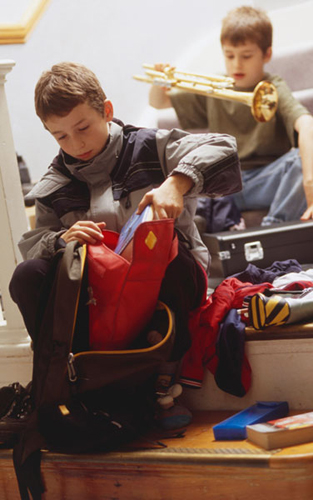| Q: |
My daughter refuses to dress nicely for school. I don’t want her to get into trouble. What can I do?
| | A: |
Your daughter is trying to fit in with her peers and be part of a
group that probably all dresses in a similar way. The school will be
used to students bending the rules to put their own individual stamp on
the regulation uniform, and, if you insist that your daughter adhere
strictly to the dress code, you risk making life difficult for her
socially. You may even find that your daughter takes matters into her
own hands and adjusts her outfit each day when she is out of your sight.
The key word here is compromise: Work together on finding a solution
that you are both happy with. Look at what other students are wearing
and try to find the middle ground between the “correct” attire and your
daughter’s must-have fashion requests.
Fitting in, developing
her own sense of identity, and having friends are very important for
your daughter at this age, so be prepared to be a little flexible to
help her achieve this. If she feels a part of things socially she is
likely to be happier at school and perform better academically.
Respecting your daughter’s point of view and negotiating also means that
your daughter will be more likely to approach you with other issues in
the future.
|
| Q: |
My daughter has the chance to go on a trip with school but doesn’t want to. Should I insist that she go?
| | A: |
Forcing your daughter to go on this trip is likely to make her
feel even more anxious and put a strain on your relationship. Instead,
talk to her to find out if she is interested in going on the trip in
principle and, if so, exactly what she is worried about that you may be
able to help with. If she is concerned about travel or sleeping
arrangements, the trip organizer should have transportation and
accommodation details and be able to let her know who she will be
sharing with. Chances are that your child will not be the only student
struggling with these issues, so speak to her teacher or the trip
chaperone to find out what else they can do to help. Work on a plan with
her to give her some simple strategies to cope with her homesickness
and let her know that it’s perfectly normal to feel this way. She could
take one or two photographs and something comforting from home to give
her something to focus on when she feels upset. Find out what the school
policy is on calling home; this is often discouraged except in case of
an emergency. If your daughter does not feel ready to tackle this trip,
there are bound to be other opportunities in the future, so help her to
get ready for the next one. In the meantime, encourage her to have
sleepovers with friends and family to develop confidence in being away
from home.
|
| Q: |
My son has become quiet and withdrawn since he started middle school. What can I do?
| | A: |
Starting middle school brings a huge number of changes, and your
son may still be adjusting to these new demands. Even if he prefers to
work things out on his own, he will still appreciate the fact that you
are aware he is not his usual self. Try saying something like, “You seem
really quiet lately—is there anything you want to talk about?” so the
choice to talk is his. Pick your moment carefully to introduce these
conversations. Short car journeys work well, since your child may find
it easier to talk sitting side by side rather than facing you and, if he
doesn’t want to talk, he knows he will be able to escape soon.
A sympathetic ear, a hug,
and a few words of encouragement to remind him of his strengths and
achievements may be all he needs to get over this hurdle. If there are
any signs that your son is being bullied or there are real issues about
schoolwork or other aspects of school life, help him come up with
solutions to his problems and speak to his teachers or principal if
necessary. He may feel happier talking to someone else in confidence
about certain issues, so check with the school to see if they offer
peer-mentoring or access to a counselor. Agree a time to review how
things are going, and keep checking in with him so knows he can call on
you for extra support if he needs to.
|
| Q: |
Should I let my daughter walk to school with her new friends rather than drop her off?
| | A: |
Sooner or later most children reach the point where having their
parents drop them off and pick them up from school is seriously uncool
and socially embarrassing. Giving up this role is bound to be stressful
for you at first and requires you to place a lot of trust and
responsibility in your daughter’s hands, but there is a lot you can do
to make sure she is safe, and your daughter will value her increasing
independence. Since these are new friends, get to know them a little by
having your daughter invite them over. Travel the route with your
daughter that she will be taking to school. If she is catching the bus,
find out where she’ll get it, and if she is walking, make sure that she
sticks to main routes rather than shortcuts and that she crosses at
crosswalks. If your daughter is allowed a cell phone in school, you
could ask her to text or call you until you both get used to this new
routine. You should also agree what your daughter will do when things
don’t go according to plan. For example, what if the bus doesn’t arrive
or her friends aren’t in school on a particular day? Once you are
confident that she understands the risks and knows how to manage them
safely, have a trial run and then a longer period of a week or so.
Remember—this is a big step for your daughter too, so give her plenty of
praise if she sticks to the plan. On days when the weather is bad, you
will probably find your services are called on once more!
|
| Q: |
My daughter says she hates school and wants to go to the same one as her best friend. Should I move her?
| | A: |
Being separated from friends in this way can be very upsetting,
but there may well be other reasons why your daughter is so unhappy at
the moment. Moving schools may seem like a very attractive option which
will solve all her problems, but in reality it may not be the best
solution. Be sympathetic to your daughter’s feelings but help her think
about alternatives, without simply dismissing her request. Sit down
together and draw up a list of her problems and worries. Ask your
daughter to rate how important each issue is, on a scale from 0 to 10.
Starting with her most important issues, go through each item on the
list and write down any ideas that might help to improve things.
Encourage your daughter to think about the consequences, strengths, and
weaknesses of each option. For example, if she was to move schools, what
would she do if there were lots of things she didn’t like about her new
one and how would she feel if her friendship ended? Agree what you will
both do to work on her problems and involve school staff if necessary.
Chances are, once
your daughter has settled into school and made a few new friends, she
will feel differently about wanting to move. However, if the situation
does not improve by the end of the year, you may need to consider this
option, before your daughter begins avoiding school or staying home
“sick” to get out of an uncomfortable situation.
|
| Q: |
My athletic son doesn’t seem interested in joining any of the school teams. Why might this be?
| | A: |
Cheering on your child from the sidelines as they win (or lose)
with their team is a proud parenting moment. Sometimes children show
less interest in sports once they move up to middle school for various
reasons. In order to join a team at his new school, your son will
probably have to go through a selection process by putting going for
team tryouts. He may be avoiding sports because he is anxious about
competing for a place against people he doesn’t know, and worried they
may show him up with their superior skills. Alternatively, it may be
that your son is just not interested in playing sports right now and
wants to pursue other interests in his free time. The influence of his
friends will play a part in how he chooses to spend his time. With the
current focus on healthy living in schools, he may have plenty of
opportunities to take part in sports activities through his normal
curriculum. Once he feels more settled in his new school, he may decide
to try out for a team, or his talents may be spotted along the way. In
the meantime, look for opportunities to support his other interests,
such as music, arts, or drama. If there is little available at school to
interest your son, you could suggest other options for him to engage in
physical exercise, such as martial arts or gymnastics. Try checking at
your local community centre to see if they offer classes.
|
| Q: |
I thought my son was doing OK at school but his last report card was terrible. How do I get him back on track?
| | A: |
There could be several reasons for your son’s drifting academic
performance. He may be finding the work too difficult, or he may be
spending too much time enjoying the social side of school and not
putting enough effort into his studies. Your son may also have other
worries that are making it difficult for him to concentrate on
schoolwork.
Alternatively, his
performance might be related to his current peer group. If your son is
being drawn toward the “cool to know nothing” crowd at school, he may
not want to risk his place by flexing his intellect. Talk to your son
about your concerns and try to identify the reasons for his
less-than-glowing report card. Be sensitive, since he might be surprised
by his teacher’s comments too—try to pick out some positives. If there
are problems at school or elsewhere, agree what you will both do to
address them. If it is a question of motivation and effort, help your
son to organize his study time, but balance this out with plenty of
leisure opportunities across the week. You could also offer him
incentives to keep his grades up.
|
| Q: |
My son finds it difficult to make new friends. I’m worried it will affect his progress in school.
| | A: |
The size, structure, and demands of middle school make it almost
impossible for children to maintain the same group of friends he once
had. Having one or two familiar faces around should help reduce any
feelings of insecurity and anxiety your son may have, even if they are
not his best friends. Friendships at this age are based primarily on
shared interests and experiences, so you may find that your son makes a
completely new group of friends before too long. Also, don’t be
surprised if children in whom your son had very little interest in his
old school now get talked about in the same breath as his other friends.
It can be hard work for parents to keep up with the friendship roster,
since positions at the top and bottom change regularly!
If your son finds it
difficult to make new friends, encourage him to talk to as many of his
new classmates as possible. It’s probably worth reminding him to ask
their names (and to give them his) to immediately strengthen any
connections he makes. It also means that you can ask about his
classmates at home. You can support your son’s developing friendships by
asking if he would like to invite classmates over after school or at
weekends. Remind him that he will still get to see his old friends
sometimes, too.
|
Moving on up A friendly breakthrough
When my son started at
middle school, I was really worried about how he would adjust. He moved
up from a very small primary school just around the corner from our home
to a huge school that is a 20-minute bus ride away. For the first few
weeks we had lots of tears and temper tantrums in the morning, and
sometimes after school, too. I tried not to interfere too much, just
hoping that things would settle down. The breakthrough came when he
started talking about a new friend he had made on the bus. They started
to meet up outside of school, and my son seemed much happier.
Once he had that one new friend things really picked up—the tears stopped, and he started to get involved in school much more.
Build them up Creating confidence
As your child enters this new and important phase in her life, she may be starting to think about her own identity.
She will be increasingly self-conscious about her looks, abilities, and
social standing with her peers and will be starting to think about what
she wants to achieve and where she fits in the world. This may leave
her feeling unsure of herself. If she feels confident about who she is,
adjusting to middle school will be easier. Praise your child for what
she can do well, and use quality time to find out about her day. Try to
share in her world, remind your child that no one gets everything right
all the time, listen attentively when she is talking to you, and
encourage her developing independence and free thinking.
NOTE
It can be hard work for parents to keep up with the friendship roster, since positions at the top and bottom change regularly
Non-public schools Considering your child’s needs
The choice to
consider a private, magnet, or charter school can be stressful.
Depending on who you talk to, you will probably hear mixed reviews of
them all. Consider the following points but, above all else, try to keep
in mind which school will best meet the needs of your child.
School environment
Most schools will have an open house for prospective students; make sure you visit those you are interested in. Don’t
be put off by less-than-attractive buildings. The outsides may not be
pretty, but as long as they are safe, well-resourced, and cared for,
it’s what goes on inside that matters. Are
there up-to-date displays of student work in classrooms and hallways?
If so, this shows the school is proud of its students’ achievements. What
subjects are available for your child to study? Are there honors
classes available? If your child needs extra help or has a particular
talent, how will they be supported? Does
the faculty seem approachable and interested in your child? Try to
speak to the headteacher, since he or she will set the tone for the
school. Does the faculty seem inspirational and committed? Visiting
on a typical day and driving past at the beginning or end of school
will help you get a picture of students’ general behavior.
Official sources
Research
Read prospectuses and check the school website for any particular interests.

Your state’s Department of Education will have plenty of information about all schools licensed within the state. If
your child has a particular interest or skill, some schools will be
better equipped to develop this, so check prospectuses and websites for
details of any specialist teaching. Academic
statistics and test scores can be a useful guide, but remember that
many students thrive in schools that don’t rank highly overall. School
inspection reports are freely available, and give a good overview of a
school’s strengths and weaknesses. Check when the report was written,
though, as the information may be somewhat out of date.
Admissions policy
Your child may be
offered a place at one or more desirable schools, though perhaps not
your (or your child’s) first choice. All schools have their own
admission policy and a limited number of places so, if you are thinking
of applying to a particular school, find out how your child fits their
criteria and investigate admissions procedures as early as possible.
Listen to your child’s point of view and involve him in the process as
much as you can.
Middle-school stresses A new set of challenges
Moving up to a bigger school
can be a stressful time, both for you and your child. New places, new
teachers, new friends, new subjects, more work and, just when it feels
like you should be providing more help for your child, he is desperately
trying to prove how independent he is!
Little fish… big pond
Your child’s new school
will probably feel like a vast maze of corridors and endless
classrooms. In reality, he will quickly learn to navigate his way around
with ease and will find that each year tends to keep to their own
territory outside. Some schools start their new students a day or two
before the rest of the school, which will give your child a chance to
roam around and look lost without feeling intimidated by the older
students. See if you can pick up a school map when you visit or on the
school’s website. If your child is able to find his way around, it will
give him a real confidence boost and probably make him more popular with
his new classmates too.
Dress to impress
Your child’s new
school will probably provide you with a long list of clothing or uniform
requirements and essential equipment. Certain items will be very
popular in the stores, so it’s best to make a start on this as soon as
possible. Keep in mind that schools often sell uniform clothing at cost,
and may also have some second-hand items. Having the right PE outfit,
the trendy school bag, and a pencil case full of favorite pens will help
your child feel prepared. Being able to lend a pen to a classmate in
need is also a great way to make new friends.
Workload and homework
Your child will have new
subjects to master, lots of books to keep track of, more homework, and a
very busy timetable. If he is good at organizing himself, this should
not pose a problem. However, if he is used to relying on you to pack his
school bag and tell him what subjects he has each day, he could be in
for a shock. Take a copy of his class schedule for yourself and suggest
he put one up in his bedroom somewhere visible—not buried behind his
latest poster. Schoolbooks that are brought home seem to mysteriously
disappear the night they are needed. Providing your child with a shelf
for school books and homework should help avoid the need for to turn
your home upside down looking for them.
Homework will steadily
increase as your child goes through school and is an essential part of
his education. Make sure he has a quiet place to work and allow him to
tackle things in his own way. Some children need a short break after
school, whereas others prefer to get their homework done right away.
Some schools also have supervised study groups after school. If your
child has a planner or homework notebook, look at it with him regularly
to make sure he is writing things down and keeping track of his
workload. You may still have to prompt him to complete his work if you
want to avoid the Sunday-evening panic.
Friend or foe?
Even though your
child will probably know some of the students at his school, he may be
feeling anxious about getting along with the older students. The older
kids at middle schools all seem to share the same horror stories about
vicious bullies who will beat him up, steal his new things, and flush
his head down the toilet. It is no wonder that your child may shrink
with fear when he first sees a crowd of towering teenagers standing at
the school entrance. The reality is that the older pupils will probably
show very little interest in your child, and there will be lots of new
classmates to make friends with. Middle school will provide your child
with the opportunity to try out new activities and joining a lunchtime
or after-school club is a great way to meet others with the same
interests.
Homework
Your child will have more work to deal with, so set him up with a quiet place to do it.

Build esteem
Encourage your child to be confident about answering questions in class.

All in one place
Make packing his school bag easier by providing him with a place to store his books.

Shy
Encourage your child to join after-school clubs to meet others if he is worried about making friends.

|